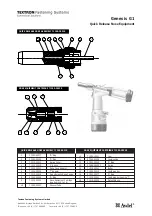
8
Water in air lines is a constant threat to the proper operation of air tools. Even near freezing
operating conditions, a good refrigerant type dryer is essential. A good dryer will remove 95%
or more of water right at the compressor. The remaining moisture is removed at the water leg in
the piping system or in the filter (Part No. 008559).
NOTE: Additional information is available in the Signode publication, "Air Supply Manual" (Part
No. 186038). If you have any questions, contact your local Signode Representative.
LUBRICATION
The air tool must be properly lubricated. This is achieved by keeping the air line lubricator filled
with oil and correctly adjusted. Without proper lubrication, the tool will become sticky and will
be difficult to release from the strap.
Install the lubricator as close to the air tool as possible. The arrow on the lubricator's top
surface must point in the direction of air flow.
For proper operation, oil must drop through the lubricator sight glass at a rate of 4 to 10 drops
per minute. This rate is checked while the air tool is running free. Only 20% of this oil is actually
delivered to the tool. The remaining oil drops back into the oil reservoir. The unit is factory set
and should require no adjustment. If an adjustment is required, the adjusting screw on top of
the lubricator may be turned as marked to reduce or increase the flow of oil.
The correct grade of oil must be used in the lubricator; too heavy an oil will not provide sufficient
lubrication and will cause sticking and sluggish operation of the air tool.
Recommended oils are any good grade of rust and oxidation inhibiting oil with a viscosity of 80-
120 S.U.S. at 100 degrees Fahrenheit. (0.15 to 0.25 cm
2
/sec. at 38 degrees Celsius), such as:
Non Fluid Oil Co., grade #LS-1236
Signode oil - Part No. 008556
If necessary, use SAE #5 or SAE #10 non-detergent, cut 1 to 1 with kerosene.
NOTE: Some oils contain anti-wear additives which may disable the tool. Be certain to use
recommended oil.
Several drops of lubricator oil added to the inlet of the air line each day will help insure good
operation. A noticeable reduction of performance can usually be corrected by squirting a few
drops of oil into the air line.
COLD WEATHER OPERATION
If a tool does not operate satisfactorily in freezing temperatures, certain steps can correct the
problem. The following steps can be taken to improve cold weather operation of the tool:
a. An air line dryer adjacent to the compressor.
b. Use lubricant recommended by Signode. Signode has tested the use of anti-freezes, none
work well in air tools; the tool will gum up when anti-freezes are introduced and will not
function properly. The best lubricant for freezing weather is the 1 to 1 oil and kerosene
combination.
c. If possible, run the air supply line to a indoor located Filter-Regulator-Lubricator or relocate
the F-L-R to a warmer operating area.
Summary of Contents for PN2-114
Page 17: ...17 VIEW B...
Page 18: ...18...






































